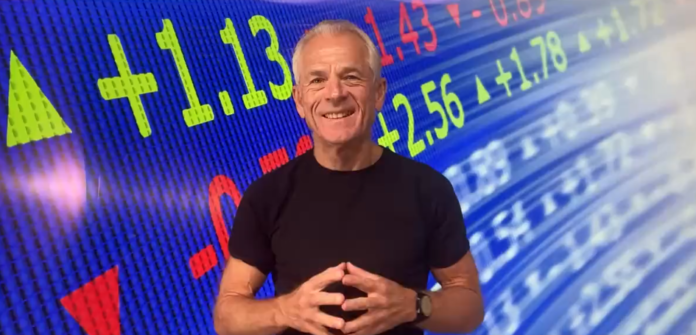Former White House business advisor Peter Navarro, who worked as an advisor to President Donald Trump, voluntarily incarcerated himself in a federal prison in Miami on Tuesday to serve a four-month sentence for contempt of Congress.
Just a day after his surrender, Chief Justice John Roberts dismissed his 11th-hour plea to remain free while he appealed his contempt conviction by Congress. According to a familiar source with the matter, Navarro was assigned to an 80-person dormitory reserved for elderly inmates in the Miami facility, where he hopes to have some access to email and phone.
Before turning himself in, Navarro claimed during a press conference in a strip mall across the street from the jail that his case represents an “unprecedented assault” on the separation of powers and executive privilege. “Stepping foot into that correctional facility today feels like a direct jab at the core principles of our democratic system,” he declared.
Navarro vowed to appeal his sentence in the Supreme Court and argued that his conviction was due to the actions of lawmakers, prosecutors, and judges who are “Trump-haters.” There is no evidence that his prosecution was politically motivated.
“This is an egregious weaponization of our judicial system,” Navarro said, referring to the decision that prevented him from presenting some defenses in court, which is now one of the subjects of his appeal.
After being found guilty and sentenced to four months in jail in January, Navarro has appealed against both his conviction and his sentence, as the appeal process is ongoing. Navarro has long maintained that his refusal to comply with the House select committee’s summons to investigate the January 6, 2021, Capitol attack was based on his belief that he was bound by executive privilege. However, the presiding judge overseeing his case ruled that there was no evidence that executive privilege had been invoked in reality.
Navarro has been ordered to transfer himself to the federal prison in Miami by Tuesday.
A panel of three judges from the D.C. Circuit Court of Appeals had already dismissed his plea to delay his sentence, writing at the time that there was no likelihood of success on a new appeal or that his sentence would be overturned.
Advocating for emergency relief from the Supreme Court and urging a stay on his surrender, Navarro’s lawyers argued that there is no risk of flight or danger to public safety, thus he should be allowed to remain free pending his appeal.
His legal team wrote in their motion to the court, “Dr. Navarro is the sole former senior presidential advisor to have been charged with contempt of Congress following a president’s assertion of executive privilege.”
They told the justices that Navarro’s indictment for contempt in response to his failure to comply with Congress’s summons constitutes a violation of the principle of separation of powers, so his sentence should be reversed and charges against him dismissed.
They also argued that Navarro’s planned questioning on appeal, which includes a claim of executive privilege, involves questions that have not previously been answered, thus his release is necessary now.
They said, “Dr. Navarro does not dispute that his failure to comply with Congress’s summons was knowing. Rather, he disputes that any such assertion of executive privilege would be consistent with the doctrine of separation of powers.” “The Justice Department opposed Navarro’s plea for release, arguing that he had failed to fulfill the standard for such relief.
In his ruling, Roberts wrote that he found “no basis to disagree with the firm determination that Navarro’s release would frustrate the purposes of the relief sought and granted by the District Circuit Panel” that originated from the emergency relief requests.
The Biden administration argued that the records sought by the January 6 committee, many of which were personal communications that would not have been covered by executive privilege, and Navarro was not contesting the district court’s finding that Trump had not actually invoked executive privilege.
The Solicitor General representing the federal government before the Supreme Court, Elizabeth Prelogar, wrote, “If executive privilege had never been claimed, then there can be no valid defense against the contempt charge here.”
Prelogar noted that presidents often decline to assert executive privilege in response to Congress’s summons and said that if any subordinate – in this case, Navarro – could end such a firm resolve, then the president’s prerogatives would be “substantially diminished.”
she countered Navarro’s claim of being ‘duty-bound’ to invoke executive privilege, despite Trump’s noncompliance. She pointed out the glaring contradiction, highlighting that the Department of Justice has never validated the notion that a former high-ranking presidential aide could face congressional contempt following a president’s executive privilege assertion.
Navarro was not the first former official of the Trump administration to be found guilty of defying the demands of the January 6 committee, but he will be the first person to report to jail. Former White House Chief Strategist Steve Bannon was found guilty of contempt for two counts of contempt of Congress for his refusal to comply with the committee’s demands and was sentenced to four months in jail, but the judge overseeing his case stayed the prison term because Bannon had appealed his own sentence, meaning that his sentence could be reversed.
- Travel Experts Rank the Top Packing Cubes for Seamless Adventures

- New Study Finds Intensive Weekend Workouts Key to Shedding Belly Fat

- What exactly is Dropshipping? A Deep Dive into the E-commerce Phenomenon

- Optimizing Supply Chain Management with Predictive Analytics: A Game-Changer for Businesses

- OpenAI Introduces Groundbreaking Audio Feature: Text-to-Speech Capability Mirrors Human Voices




